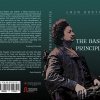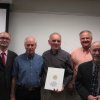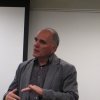The “Karlo Bijelicki” City Library of Sombor in Serbia, published Kostic’s philosophy book The Basic Principle in the Serbian (2015) and English (2016) languages. The English translation was made by Dr. Predrag Cicovacki, Professor of Philosophy and Peace Studies at College of the Holy Cross, Worcester, MA and Heidi Nada Grek. In a room of curious attendants, Dr. Cicovacki delivered a lecture about the life and work of Laza Kostic including his philosophy book The Basic Principle. The lecture was a collaborative effort between the Duquesne University and the Serb National Federation. Dr. James Swindal, Professor of Philosophy and Dean of McAnulty College and Graduate School of Liberal Arts at Duquesne University, John Martich, President of the Serb National Federation, and Milos Rastovic, Cultural Outreach Coordinator of the Serb National Federation, introduced themselves, their organizations, and the book to an audience of students, academics, and community members interested in Serbia, philosophy, and the work of Laza Kostic.
Dr. Swindal and Mr. Martich stressed the importance of cooperation between the two institutions in order to show the accomplishments of Laza Kostic and the numerous other treasures of Serbian culture and tradition which should be more accessible to American audiences in order to help current and future generations to overcome remnants of negative narratives and show that Serbians care about and have made great contributions to the world. Last year, as a result of their cooperation, Duquesne University and the Serb National Federation presented the book Christian Heritage of Kosovo and Metohija at Duquesne University. This book was published by the Sebastian Press, Western American Diocese of the Serbian Orthodox Church in North and South America. I draw attention to the importance of English publication of Kostic’s book: “The first edition of this book was published in 1884 in Serbian language. After more than one century, thanks to Dr. Cicovacki this philosophy book was first time published in English. With this book, Serbian philosophical tradition becomes more accessible to the American and Western audience in general. What is common to Laza Kostic, Dr. Cicovacki, and myself is that we all three are from Sombor, Serbia, a town which possesses a cozy and bohemian atmosphere for prolific writers, poets, philosophers, and artists.”
Dr. Cicovacki discussed Kostic’s rebellious nature in the social environment in Serbia at the end of ninetieth and early twentieth century. Kostic’s profligate philosophical and artistic spirit elevates poetry to the top of the Serbian and European artistic traditions. His most famous poem “Santa Maria della Salute,” recounts his tragic love for Lenka Dundjerski. Dundjerski, who was much younger than Kostic, permanently sealed his fate as a romantic poet as she became his inspiration for the poem. Throughout “Santa Maria della Salute” is woven his inexhaustible love and suffering for Lenka.
According to Dr. Cicovacki, the book The Basic Principle was hidden “in the dungeons of the archives and by not translating it into any foreign language so that the world does not laugh at it... We have been afraid of a scandal while in fact there is so much to be proud of” such as Serbian epic poetry, of which the world barely knows. Kostic was one of the most educated writers in his time; he spoke eight foreign languages with a good knowledge of European philosophical tradition. In this book, Kostic is mocking philosophy traditions, but at the same time he offers his own philosophical view (Weltanshauung). Considering traditional philosophical questions of Ancient Greece and throughout the history of Western philosophy, Kostic found the source of the world and all its things in one basic principle – that is “intercrossing.” While Heraclitus’ philosophy is based on the unity of opposing powers, Kostic’s opposing powers encounter and resolve in the “intercrossing.” Harmony and symmetry are two manifestations of the basic principle of “intercrossing.” Harmony and symmetry create a beauty, which he found in the Ancient Greek tragedy and the Serbian medieval epics.
The lecture of Dr. Cicovacki emphasized the main impulse of Kostic’s philosophy and life, and Serbian people in general, and that is the line of the heart. While the Western philosophical tradition neglected the line of the heart and was more obsessed with the mind, Kostic distinguished the power of emotions and soul.
On behalf of the Serb National Federation, John Martich bestowed Dr. Cicovacki with the book Serb National Federation – First 100 Years because of his contribution to Serbian culture in the United States. Dr. Jeffrey McCurry, Director of the Simon Silverman Phenomenology Center at Duquesne University, received the gift book The Basic Principle by Laza Kostic for the Simon Silverman Phenomenology Center Collection.
After the lecture, Dr. Cicovacki visited the SNF Home Office where he was introduced to the history and mission of the Serb National Federation. He signed the SNF Guest Book with the following words:
“I brought a bit of the Serbian history here, as well as a piece of the great Serbian heart.
Let us preserve our beautiful culture,
let us appreciate our tragic history,
let us educate the new generation in the spirit of sacrifice, honor and integrity.
Let our beloved country live and flourish.”
This event was sponsored by the Duquesne University and Serb National Federation, the oldest Serbian Fraternal organization in the North America since 1901. Next year, the Serb National Federation is planning to screen the movie “Santa Maria della Salute” by Zdravko Sotra about the life and work of Laza Kostic at the Serbian Movie Festival at University of Pittsburgh.
Milos Rastovic









